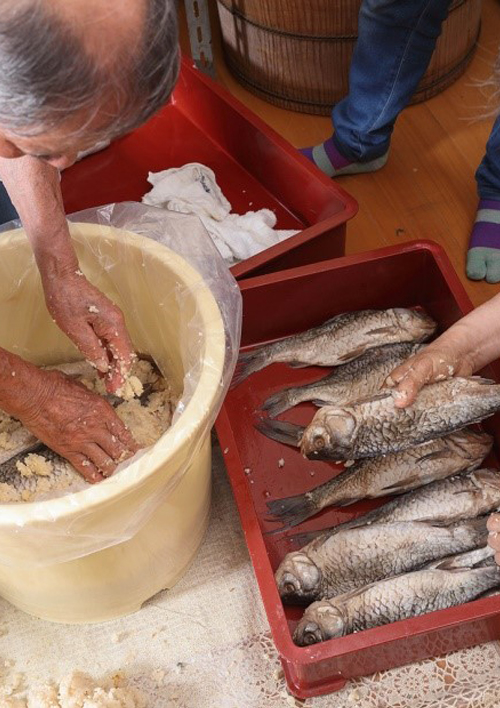International Colloquium on Line Cultural Transmission against Collective Amnesia:Bodies and Things in Heritage Practices

Processing funa-zushi, traditional fermented fish and rice in the Shiga area, Japan.
| Date | November 5 (Sat) and 6 (Sun), 2022 |
|---|---|
| Venue | Zoom meeting space |
| Capacity | 250 (Registration required, first-come-first-served basis) |
| Registration | Access the Google forms with the URL or QR code below, fill your contact, and check the session(s) you plan to participate. We will send the URL and password of the Zoom space on the same (or previous) day of the event. |
Objectives
Because of magnifying human settlement as well as technology enabling speed production and built-environment destruction, the modern world is said to suffer from collective amnesia (Connerton 2009). This issue is not only sociological but also personal, for our personal memory is closely linked to the environment where she / he acts. For the same reason, resistance to collective amnesia is made by various kinds of groups in various ways from storytelling on familial level to editing formal history on governmental.
Such trials of memorizing practice, which this colloquium focuses on, almost coincides with so-called cultural transmission. With this common recognition, the project members already discussed in five serial webinars held in February and March 2021. After one and half an year later, in an opportunity to proceed the publication process, the project members meet together in Osaka, Japan, to review the range of the problematique and the general challenges. We will open the discussion to the zoom audience to share actual issues on the front line.
Connerton, Paul 2009 How Modernity Forgets? Cambridge: Cambridge University Press.
Program
First Session: Materialized Culture
Date: November 5, 2022 (Sat) 13:30 – 16:00 (JST) / 4:30 – 7:00 (UTC)
| Opening Remarks / Kenji Yoshida (Director-General, National Museum of Ethnology, Japan) | |
|---|---|
| 1-1. | Aromica Bhattacharya (PROMPERÚ India Office, India) Reclaiming a Wooden Craft as Afro-Peruvian Musical Heritage |
| 1-2. | Wakana Sato (Kyoto Women’s University, Japan) Inheritance of Handcrafting Techniques for Ethnic Costumes: Absence of Young People Due to Labor Migration from Rural China |
| 1-3. | Yukako Yoshida (Tokyo University of Foreign Studies, Japan) Masks and Costumes in the Transmission of Balinese Performing Arts |
| 1-4. | Kati Lindström(KTH Royal Institute of Technology, Sweden Does World Heritage Nomination Curb the Local Regeneration and Cultural Transmission of Practices? From World Heritage Nominations of Fuji-san and Sites of Meiji Industrial Revolution. |
| 1-5. | Eisuke Tanaka (Hokkaido University, Japan) “We are Turkish Nomads from Lycia:” The Changing Relationship between the Locals and Mountain Paths as ‘Heritage’ in the Context of Tourism in Teke Peninsula, South Turkey |
| 1-6. | Rikutaro Manabe (University of Tokyo, Japan) Designing Participatory Community Archiving: How to Share Community Information through Digitization and Digital Tools |
| 1-7. | Taku Iida (National Museum of Ethnology, Japan) Making Museum Objects Revive in Human Societies: An Experience of an Image-Sharing Project between Africa and East Asia |
| Discussion | |
Second Session: Integrative Transmission of Components
Date: November 6, 2022 (Sun) 13:30 – 16:00 (JST) / 4:30 – 7:00 (UTC)
| 2-1. | Graeme Were (University of Bristol) Cultural Transmission in the Digital Age: Learning Kastom in New Ireland, Papua New Guinea |
|---|---|
| 2-2. | Hiroshi Nawata (Akita University, Japan) Portrait Rights Issues and Photographic Archive of the Motoko Katakura Middle East Collections |
| 2-3. | Neil Carrier(Univ. of Bristol, UK) Visual heritage and the city: Digital Technology and Nairobi Photographic Archives |
| 2-4. | Makito Minami (National Museum of Ethnology, Japan) Collaboration between Museums and the Source Community: Sharing Audio Materials of the Sarangi Music of the ’80s in Nepal |
| 2-5. | Jon Kay (Indiana University, USA) Generativity, Heritage Practices, and the Well-being of Older Adults: How a University-based Folklore Program Helps Elders |
| 2-6. | Akira Matsuda (University of Tokyo, Japan) The Recent History of Ancient Burial Mounds in Japan |
| 2-7. | Daniel Saucedo Segami (Ritsumeikan University, Japan) A Bridge between the Past and the Present: Cultural Heritage as a Mean to Build Social Memory in Peru |
| Discussion | |
